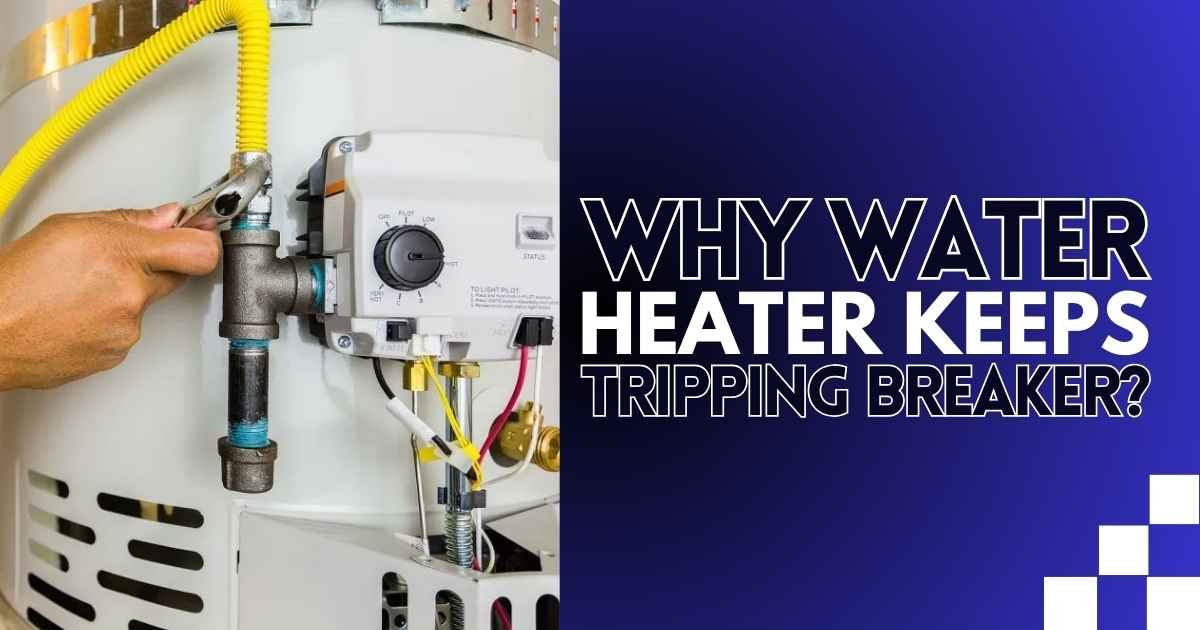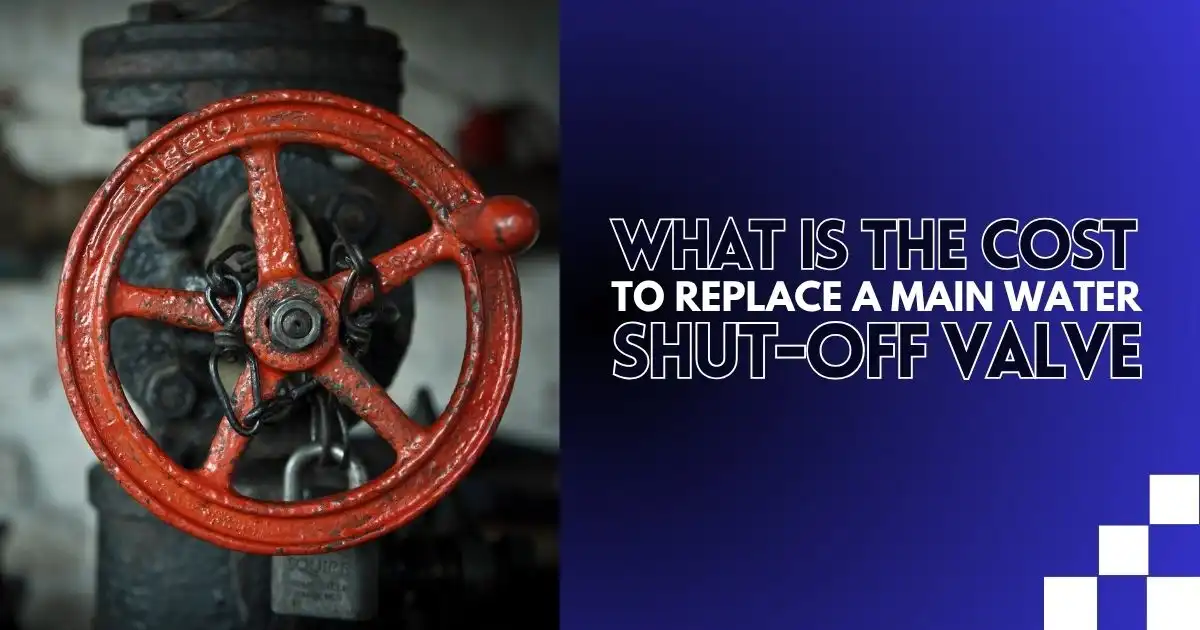A tripping breaker might seem like a small issue, but that small inconvenience could be a ticking time bomb. Turning a blind eye to these warning signs won’t just leave you without hot water–it could cause fires, system breakdowns, or worse.The longer you wait, the worse the problem gets, turning a simple fix into a costly disaster.
In Las Vegas, where electrical systems are often taxed by high temperatures and increased energy consumption, it’s imperative to address these problems promptly.
What is a Water Heater?
A water heater is an important household appliance that heats water for activities like bathing, cooking, and cleaning. It uses electricity, natural gas, or propane to generate heat, raising the water temperature. Depending on the model, it can store water in a tank or heat water instantly when needed for various tasks.
Water heaters come in different types, including tankless, tank-based, and solar models, each designed for specific household needs. Regular maintenance and inspection are important to guarantee optimal operation, prevent malfunctions, and extend the heater’s lifespan.
8 Reasons Your Water Heater Tripping the Breaker
Is your water heater frequently tripping the breaker? This often signals a hidden electrical problem, such as a faulty hot water breaker, that needs attention to prevent damage or safety hazards. These are the possible causes and solutions for keeping your water heater running smoothly.
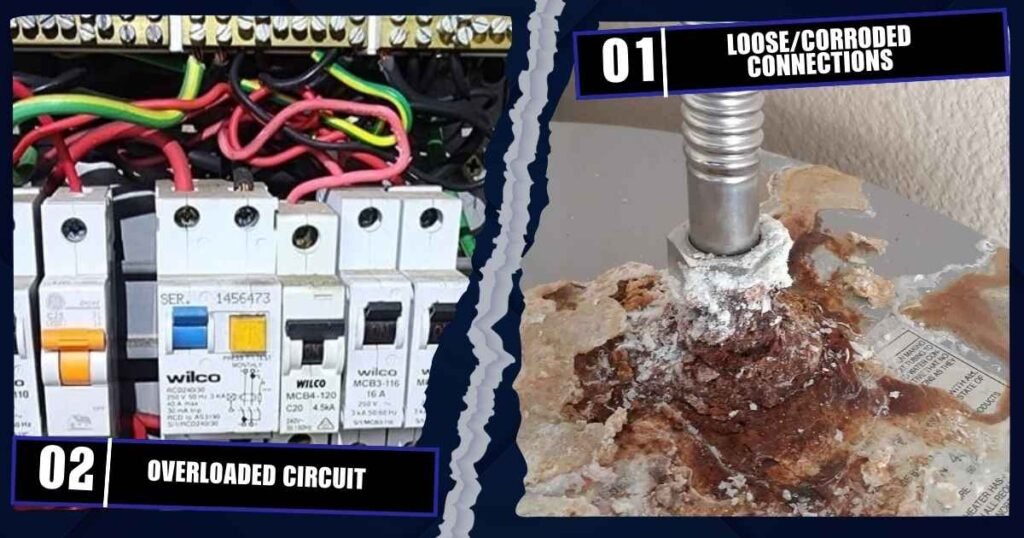
1. Loose/Corroded Connections
Loose or corroded connections can cause a water heater breaker to trip. Over time, electrical connections between the heater and the breaker may weaken due to wear, tear, or moisture exposure.Damaged connections disrupt flow, causing overheating and breaker trips, leading to more electrical issues or failure.
Regular maintenance and inspection help detect and fix loose or corroded connections before they cause major issues. Tightening connections, cleaning corrosion, or replacing damaged wiring secures safe operation. Preventative care extends the water heater’s lifespan and reduces the risk of shutdowns, electrical issues, and hazards.
2. Overloaded Circuit
If your water heater shares a circuit with other high-power appliances, the overload can trip the breaker to ward off overheating, damage, or fire hazards. Breakers cut power when detecting excessive current, protecting your home’s wiring from potential failures.
To stop these issues, it’s important to verify that your water heater has its own dedicated circuit. A separate circuit prohibits power disruptions, enhances safety, and improves the heater’s efficiency. If breaker trips persist, consult an electrician to assess your setup and prevent overloading for reliable water heater operation.
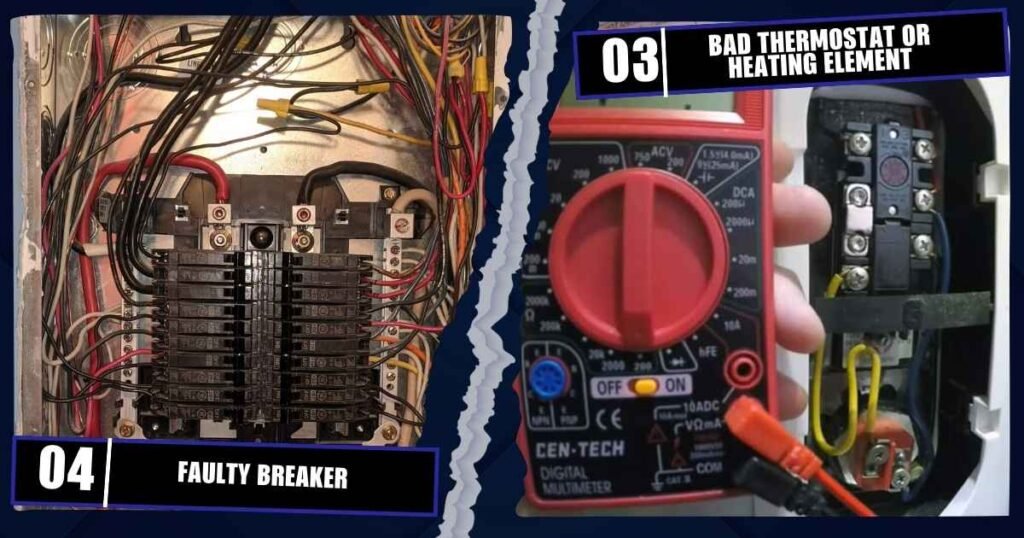
3. Bad Thermostat or Heating Element
A faulty thermostat or heating element can cause breaker trips by drawing too much current. A malfunctioning thermostat may overheat, and a damaged element can short-circuit, leading to inefficiency, higher energy bills, and safety risks. Timely repairs facilitate safe and efficient operation.
To avoid repeated breaker trips and support reliable operation, it’s important to have a professional inspect, diagnose, and fix faulty parts. Routine checks and prompt repairs help extend your water heater’s lifespan and encourage safe, optimal performance over time.
4. Faulty Breaker
A faulty breaker is a common cause of water heater trips. Water breakers can wear out, leading to frequent tripping or failure to trip when needed. This can create safety risks, like fire hazards. If your water heater is functioning properly but trips persist, the breaker may be the issue.
It’s good to have a professional electrician inspect and, if necessary, replace the faulty water breaker. Regular electrical system maintenance helps reduce unexpected failures, making sure your water heater operates safely and effectively without unnecessary interruptions.
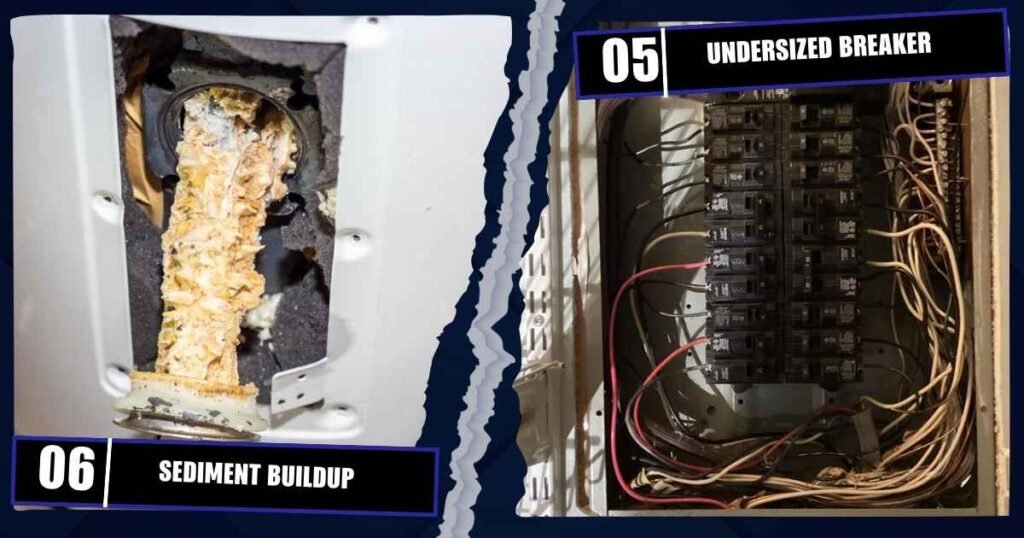
5. Undersized Breaker
An undersized breaker can cause frequent trips if it’s too small for the water heater’s electrical load. Even if the heater works fine, the breaker may trip to protect against overheating or fire hazards. Replacing it with a properly sized breaker confirms safe operation and deter unnecessary shutdowns.
To keep your water heater from tripping due to an undersized breaker, make sure the breaker is properly rated for the heater’s electrical load. Have a licensed electrician assess your setup and replace the breaker with one that matches the water heater’s specifications. Regular inspections help safe operation.
6. Sediment Buildup
If you don’t flush your water heater annually, minerals like calcium and magnesium from hard water can build up inside, forming a thick sediment layer. This forces the unit to work harder to function normally, potentially causing the breaker to trip due to excessive strain on the system.
To remove sediment, you’ll need to flush your water heater, which you can do yourself to save on service costs. It’s also important to inspect the anode rod, which helps prevent rust and corrosion in the tank. The anode rod deteriorates before the water heater, releasing electrons to slow corrosion.
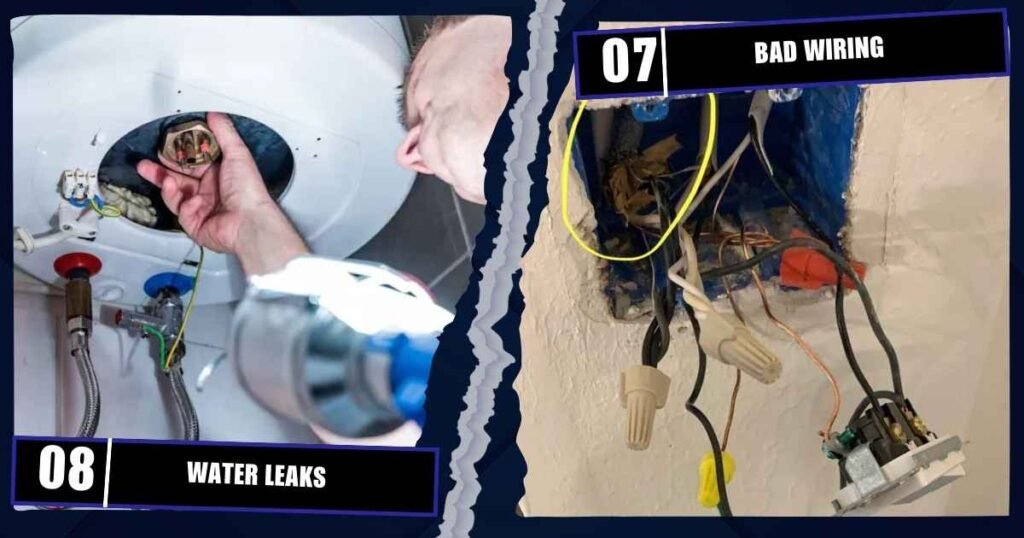
7. Bad Wiring
A tripping breaker may not always be caused by internal wiring in the water heater. Sometimes, the issue lies elsewhere in your home’s wiring or an overloaded electrical circuit. If too much demand is placed on the circuit, the breaker will keep tripping, no matter what adjustments are made to the water heater itself.
Major electrical work usually requires permits and a licensed electrician for safety. If you experience flickering lights, breaker trips, discolored outlets, or other signs of wiring issues, contact a local electrician. They may recommend upgrading your amperage or rewiring your home, rather than replacing your water heater.
8. Water Leaks
A loose pressure relief valve or cracks and holes in the water heater tank can lead to leaks. If water comes into contact with electrical wiring, it can cause a short circuit, potentially triggering the breaker. Regular inspection and maintenance are important to avoid such issues and ensure the safe operation of the heater.
Water leaks, even from small issues like a faulty pressure relief valve, can lead to a tripped breaker. This repair should be done by a professional familiar with handling wet electrical components safely. If you spot any water near your water heater, turn off the circuit breaker right away and call an expert.
5 Water Heater Signs and Malfunctions
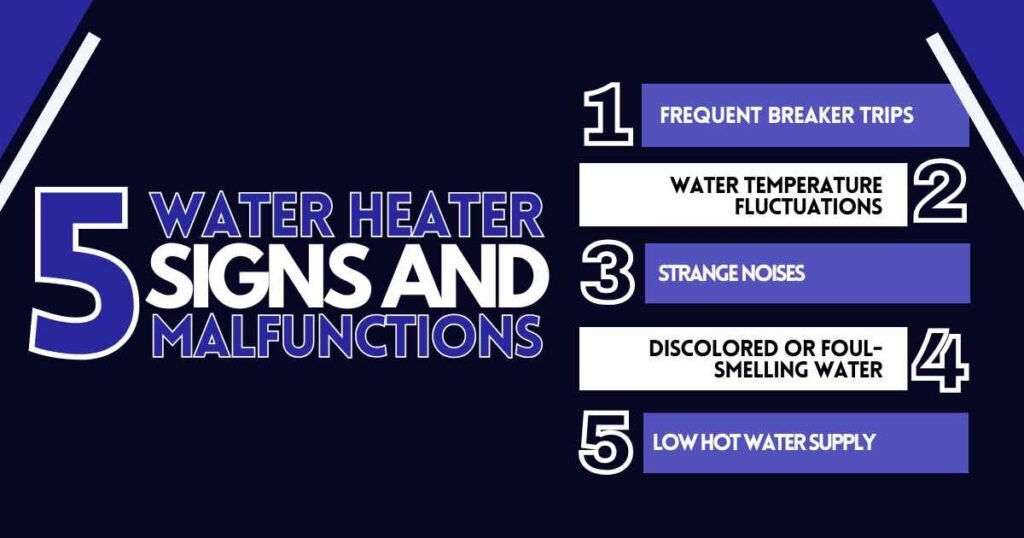
Figuring out why your water heater keeps tripping the breaker is the first step in solving the problem. Identifying these issues will help restore normal operation, prevent future interruptions, and extend the life of your water heater.
1. Frequent Breaker Trips
Continuous trips of the circuit breaker often point to hidden electrical problems, such as damaged or worn-out wiring, faulty connections, or an overloaded circuit. These issues can cause the breaker to trip as a safety precaution to prevent overheating, electrical damage, or even potential fire hazards if left unaddressed.
2. Water Temperature Fluctuations
Inconsistent hot water is often a sign of a malfunctioning thermostat or heating element. A faulty thermostat may fail to regulate the water temperature correctly, while a damaged heating element could cause insufficient heating. Either issue can lead to fluctuating water temperatures, affecting your comfort and the water heater’s efficiency.
3. Strange Noises
Rumbling or popping sounds in your water heater are usually caused by sediment buildup at the bottom of the tank. As water heats, trapped minerals like calcium and lime form deposits, creating noise and reducing heating efficiency. This buildup can also cause the heater to work harder, increasing energy consumption.
4. Discolored or Foul-Smelling Water
Brown or smelly water coming from your water heater could indicate rust inside the tank, often caused by corrosion of the metal. Alternatively, bacterial growth, especially from standing water in the tank, can also result in foul odors. Both issues compromise water quality and may require immediate attention.
5. Low Hot Water Supply
Reduced hot water output can be a sign of several issues, including a malfunctioning thermostat that fails to regulate temperature or a damaged heating element that doesn’t heat properly. Additionally, sediment buildup inside the tank can obstruct heating, making it harder for the water to reach the desired temperature.
Check the Heater, Reset the Breaker!
A single mistake could cost lives. If you notice anything unusual—flickering lights, a tripping breaker, or a plug that feels too hot—don’t ignore it. Get a licensed electrician to inspect it immediately. Your family’s safety is priceless, and one small step can eliminate a life-threatening accident. Act now—because when it comes to electricity, there’s no room for mistakes!
Don’t take chances with your family’s safety. If you notice flickering lights, tripping breakers, or overheated plugs, let Vegas Plumbing Pros handle it. Our licensed electricians will make sure everything is safe and secure. Call us today—your peace of mind starts with a simple step!
FAQS
Why does my water heater keep shutting off after resetting?
A water heater may sometimes draw excess power, causing the breaker to trip. This issue, known as water heater tripping breaker, can happen for various reasons or seemingly at random. If the breaker keeps tripping, turn it off and check for issues. Ongoing problems may need professional repair.
What happens if a water heater circuit breaker trips?
A short-circuited heating element can trigger the limit switch, tripping the breaker and shutting off the water heater. Another issue could be the heating element staying on when it shouldn’t, leading to overheating and system failure. Identifying and addressing these problems promptly can help prevent further damage and ensure safe operation.
Can a hot water heater be tripping a breaker?
As a water heater ages, its components can deteriorate, causing electrical issues and malfunctions. Without maintenance, this increases the risk of hot water heater breaker trips and further damage. Regular inspections and timely repairs help maintain efficiency, extend lifespan, and guard against unexpected shutdowns from electrical failures.
Why would a water heater trip the breaker?
A water heater circuit breaker can trip due to a faulty heating element, broken thermostat, damaged wiring, or an overloaded circuit. An old or weak breaker can also cause this issue. Fixing these problems helps keep the heater running safely.
